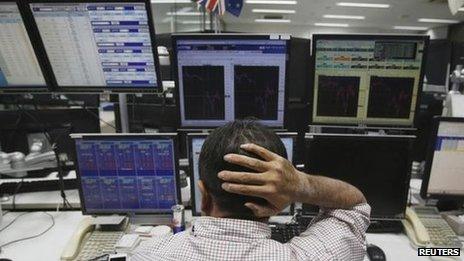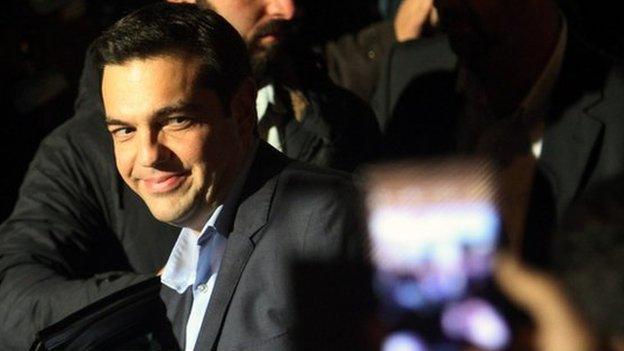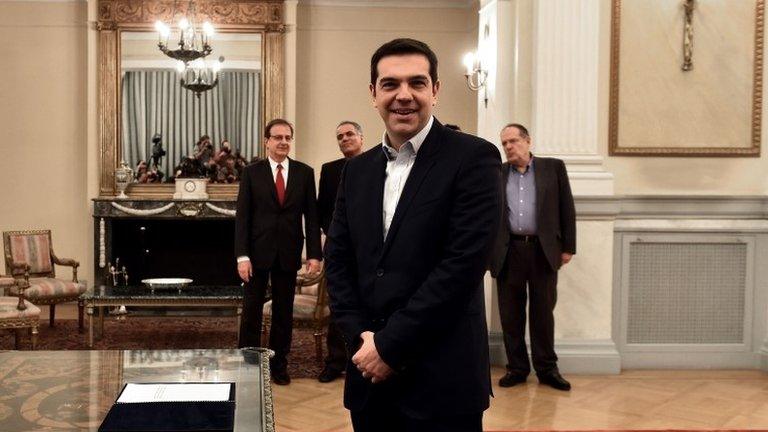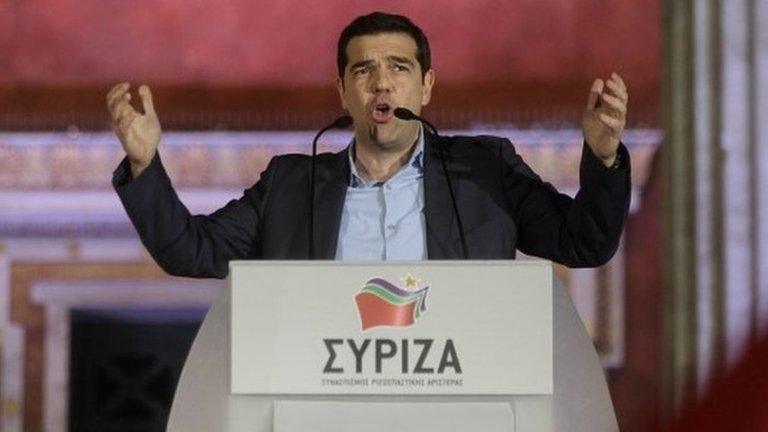Greece: Germany warns over debt commitments
- Published
Jeroen Dijsselbloem: "The major problems in the Greek economy have not disappeared"
Germany has warned the new Greek government that it must live up to its commitments to its creditors.
German government spokesman Steffan Seibert said it was important for Greece to "take measures so that the economic recovery continues".
His comments were echoed by the head of the eurozone finance ministers' group.
The far-left Syriza party, which won Sunday's poll, wants to scrap austerity measures demanded by international lenders, and renegotiate debt payments.
However Jeroen Dijsselbloem, president of the Eurogroup, said on Monday: "There is very little support for a write-off in Europe."
Speaking after a meeting of eurozone finance ministers in Brussels, he said members should "abide by the rules and commitments".
Meanwhile the German government said that Greece's new leadership should take measures to ensure the economic recovery continues.
"A part of that is Greece holding to its prior commitments and that the new government be tied in to the reform's achievements," government spokesman Steffan Seibert said.
Market reaction
Syriza's victory has caused some concern in the financial markets.
In a volatile start to the week the euro briefly touched an 11-year low against the dollar, before recovering to trade almost 0.7% higher against the US currency.
In Athens the stock market closed 3.2% lower, with particularly heavy losses for Piraeus Bank which fell 17.6% and Alpha Bank which fell 11.6%.

Syriza leader Alexis Tsipras helped calm investors' nerves when he said in a speech that he wanted negotiation, not confrontation, with international lenders.
"The new Greek government will be ready to co-operate and negotiate for the first time with our peers a just, mutually beneficial and viable solution," Mr Tsipras said following his election win.
The troika of lenders that bailed out Greece - the European Union, European Central Bank, and International Monetary Fund - imposed big budgetary cuts and restructuring in return for the money.
But Mr Tsipras said: "The troika for Greece is the thing of the past."

Analysis: Robert Peston, BBC economics editor
If Syriza were to win its negotiations with the rest of the eurozone, other anti-austerity parties would look more credible to voters. The victory of protectionist Marine le Pen in France's presidential election would be an interesting test of markets' sangfroid.
And if Syriza were to lose in talks with Brussels and Berlin, and the final rupture of Greece from the euro were to take place, investors might well pull their savings from any eurozone country where nationalists are in the ascendant.
So why are investors not in a state of frenzied panic? Why have the euro and stock markets bounced a bit? One slightly implausible explanation is that investors believe the eurozone would actually be stronger without Greece, so long as no other big country followed it out the door.
More likely is that they believe reason will prevail, and Berlin will sanction a write-off of Greece's excessive debts.

'Stand-off'

Syriza party leader Alexis Tsipras was sworn in as Prime Minister on Monday
Greece's current bailout programme ends in February, and economists say a short-term deal will be negotiated, buying time for more difficult negotiations.
"There is a danger of a prolonged stand-off with the troika as Syriza attempts to negotiate some form of official debt restructuring while not reneging on its promises to voters to cut taxes, raise government spending and increase the minimum wage," said Jonathan Loynes, chief European economist at Capital Economics.
Michael Hewson, chief market analyst at CMC Markets, said: "You can be almost certain that these negotiations will be watched carefully by the anti-austerity movements in Spain, Portugal, Italy and France to see what measures if any Greece is able to get out of EU politicians to deal with the problem of Greece's debt, and the terms of the bailout programme."
UK Chancellor George Osborne urged all sides to "act responsibly" in any negotiations over Greece's bailout terms. He told the BBC that he understood why, with the Greek economy in trouble, voters were "looking for other answers".
In an indication of the nervousness on the financial markets, yields on three-year government bonds rose by more than 2 percentage points to 12.36%.
The rise reflects investors' concerns about short-term risks of a debt restructuring over the coming months.

Key dates
26 January: Pre-scheduled meeting in Brussels of Eurogroup finance ministers expected to discuss Greece
12 February: EU leaders' summit in Brussels, which newly-elected Greek prime minister Alexis Tsipras is due to attend
16 February: Another Eurogroup meeting due to discuss "state of play" in Greece
28 February: Current programme of loans to Greece under the European Financial Stability Facility ends. There is still €1.8bn of loans that could be disbursed to Greece if it meets the conditions imposed by the troika
First quarter of 2015: Economists estimate that Greece needs to raise about €4.3bn to help pay its way, with Athens possibly having to ask the IMF and eurozone countries
19 March: Another EU leaders' summit

- Published26 January 2015
- Published26 January 2015

- Published26 January 2015

- Published25 January 2015
